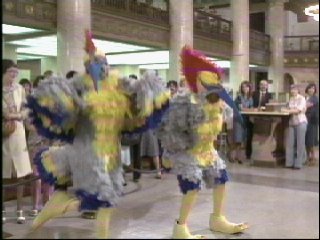 Stir Crazy (1980) I can picture Sidney Poitier discussing his vision for the film with Wilder and Pryor, who have every faith that he can pull it off. "You see…I want to make a slapstick comedy…but it's a buddy drama…and a prison film…but really more of a rodeo movie…and a love story. Are you guys with me?" Wilder keeps his supportive smile plastered on his face while Pryor fidgets, just wondering when the check's going to be cut so he can go back home and continue freebasing. Stir Crazy is an utter mess from start to finish, so poorly directed that you wonder how Poitier was given the opportunity to go on and make further films—especially given that those films include Ghost Dad and Hanky Panky. Does he have embarrassing photographs of Gene Wilder and Bill Cosby or something? The plot centers around playwright Wilder and actor Pryor arbitrarily deciding to "go west" to "make it," but they end up in a Southwestern town where they must don chicken outfits for some kind of highly improbable bank promotion wherein they sing and dance for about two straight minutes, in the chicken costumes. The song they sing, incidentally, supposedly a jingle, has no observable melody, but just meanders around uncomfortably, quite like the film itself. While on a donut break, two "thugs" steal the costumes and use them to pull off a bank robbery, which they accomplish in approximately the exact time it takes Pryor and Wilder to eat their donuts. Upon returning to the bank, our heroes are incorrectly identified as the robbers, and so they go to jail.
The jail scene is almost funny… this is the "We bad, we bad" scene, but it's not nearly as funny as you probably remember it. Similarly, 3rd grade fractions are not nearly as difficult as you probably remember them. Don't you love it how immediately when anyone goes to jail in an attempted comedy, the first thing they worry about is the assumedly imminent danger of being sodomized? Ha, ha. Because Southwestern courts are so unfair, Wilder and Pryor end up actually going to prison, but you can't tell whether they are actually scared about this, or whether they are just goofing around. The characters are about as ambiguously drawn as can be. Wilder is vaguely "crazy," Pryor is vaguely "nervous," but these attributes are primarily utilized to give corrupt prison employees their comeuppance, rather than to, say, have any manner of organically developed story. In prison, Wilder becomes something of a poor man's Cool Hand Luke, foiling all of Craig T. Nelson's attempts to break his spirit. There is one funny moment where Wilder is given a week in solitary confinement inside a tiny wooden box, and upon being released, he asks for "just one more day, please." That's about it. Most of the rest of the humor comes from fart jokes and/or pot jokes. The whole thing plays like a badly done TV movie, right down to the "Taxi"-esque smooth jazz score courtesy Tom Scott, but with gratuitous strip club scenes thrown in for theatrical marketability. And on a personal note, there is far too much harmonica playing throughout the movie. Wait, that wasn't a personal note at all. Well, whatever, my writing has never been as halfassed as this movie is. About three-quarters of the way through, the movie turns into a rodeo thing, with a supposedly "ingenious" prison escape escapade thrown in. Mainly I just sat there in stupefied silence, wondering whether anyone still holds on to the idea that this is a "great movie." Then there's a completely forced romance angle with JoBeth Williams, whose sex symbol status in the 80s continues to elude my comprehension, as does Craig T. Nelson's commercial viability in any decade, and finally a tidy ending wherein Wilder and Pryor, upon escaping from prison, learn that they've been released from prison, this procedure apparently needing no approval from the court. Yuck, the more I think about Stir Crazy the worse it gets. My biggest shock was that the big "mean" mass murderer character who sings "Down in the Valley" later on in the film is not really played for laughs, but rather for some kind of dramatic sympathy. Sidney Poitier didn't really do anything right here, now that I think about it. Why did he want to make comedies, exactly? Now I'm just getting angry.
Review by Bess Bye |
